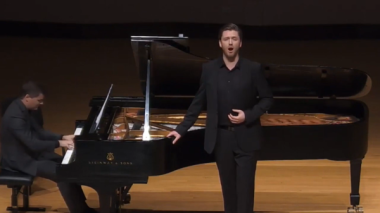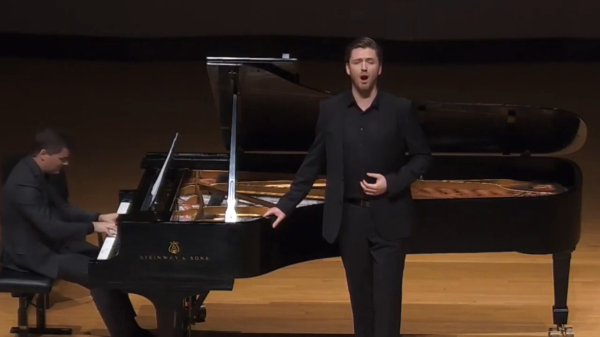
 United Kingdom Oxford International Song Festival 2023 [2] – Brahms, Schubert, A Brahms Fantasy: Samuel Hasselhorn (baritone), Markus Hadulla (piano). Holywell Music Room, Oxford, 19.10.2023. (CR)
United Kingdom Oxford International Song Festival 2023 [2] – Brahms, Schubert, A Brahms Fantasy: Samuel Hasselhorn (baritone), Markus Hadulla (piano). Holywell Music Room, Oxford, 19.10.2023. (CR)

Brahms – Alte Liebe, Op.72 No.1; Sehnsucht, Op.49 No.3; Am Sonntag Morgen, Op.49 No.1; Feldeinsamkeit, Op.86 No.2; Kein Haus, keine Heimat, Op.94 No.5
Schubert – Ganymed, D544; Prometheus, D674; An Schwager Kronos, D369; Grenzen der Menschheit, D716; Memnon, D541; Philoktet, D540; Fahrt zum Hades, D526
Brahms – Vier ernste Gesänge, Op.121
Prompted by the theme of this year’s Oxford International Song Festival, tracing the connections between song and the visual arts, the springboard for this recital was the book Brahmsphantasie created by Max Klinger and presented to the composer in 1894. It featured illustrations inspired by his songs, and some of these were projected on to the back wall of the Holywell Music Room during the performance of the songs here, though it was not clear which of those specifically stemmed from any of the songs by Brahms here in the first half, other than that of a man lying back carefree in a field, clearly depicting Feldeinsamkeit. (As the Four Serious Songs came in 1896, after the book, there were no connections for that.) Curiously the Classical Greek mythological themes that occur in the book were better evoked musically by the sequence of Schubert’s songs here (all but one setting poems by Goethe) and the picture of Prometheus having his liver eaten by an eagle oddly appeared during An Schwager Kronos rather than Prometheus itself (one could perhaps construe the ravages of time as having an equally destructive and rapacious effect).
Perhaps unexpectedly too, it was the Schubert songs which were notably more impassioned and vehement than those by Brahms, eliciting a persuasively vociferous and forceful performance from Samuel Hasselhorn, making his impressive first appearance at this festival. There was almost a growling richness in his voice, but always expressively carried rather than simply rough, and also a surprising lightness and lyricism in his upper register, extending into an attractive tenor mode. Prometheus secured some powerful protestations against the gods from him, as also the urgent, driven manner carried relentlessly through Am Schwager Kronos as the thrilling climax of the recital’s first half before the interval. Grenzen der Menscheit, Philoktet and Fahrt zum Hades drew more dynamic and contrasting dialogues between singer and Markus Hadulla at the piano, the latter tending to be more playful or quizzical to deepen the meaning of the text, compared with the more serious trajectory of Hasselhorn’s singing.
The Brahms settings at the beginning also received strenuous accounts from Hasselhorn within their less portentous remit, Sehnsucht a touch excitable in its yearning visions of the singer’s distant maiden, Am Sonntag Morgen buoyed by the furtive tread from the piano, and Feldeinsamkeit steady in its blissful contemplation of eternal space from lying back among the fields, though with an unsettling hollow sonority at the thought of death, anticipating the Four Serious Songs at the end of the recital. Kein Haus, keine Heimat was a vigorous but ironic protest at the world’s callousness, pre-empting the combative polemics of some of the Schubert songs to follow. Those Serious Songs were appropriately solemn, heralded by Hadulla’s chorale-like introduction to the first number, and although Hasselhorn remained boldly sonorous and movingly engaged with their uncompromising themes, the angst of O Tod, wie bitter bist du registered more as a lament or expression of resignation, rather than another tirade. True calm and renunciation were attained in Schubert’s Im Abendrot as an encore, the piano’s chords spread warmly and Hasselhorn lyrically projecting a sense of fulfilment as a satisfying conclusion to the unfaltering intensity of his response to the songs and their texts.
Curtis Rogers
